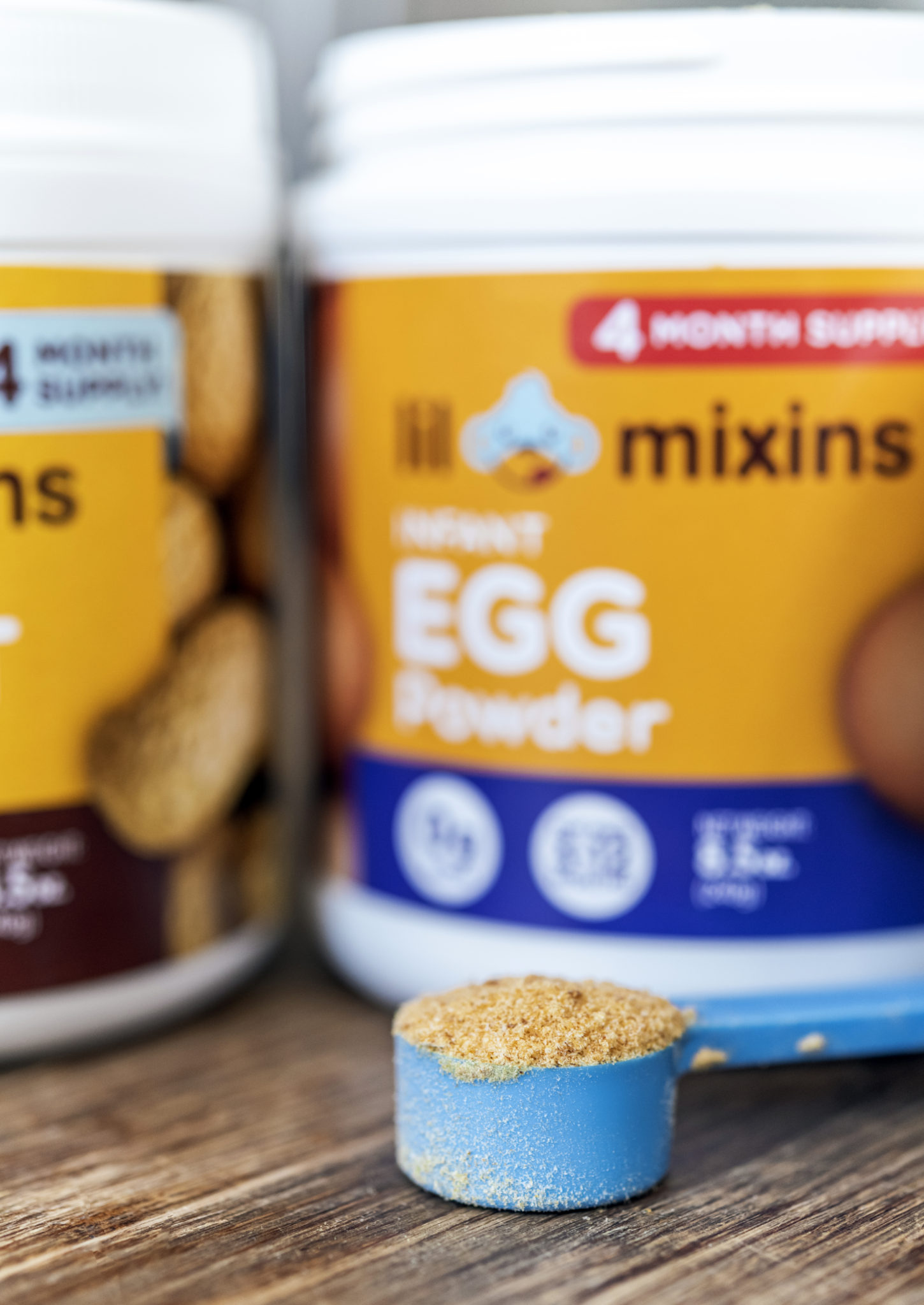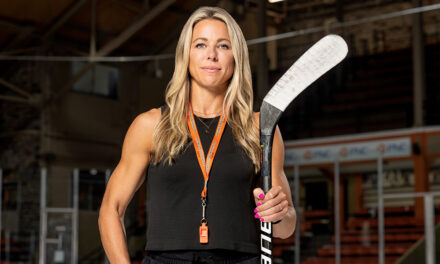After Meenal Lele’s infant developed severe food allergies, she used her skills as a chemical engineer and researcher to develop a product called Lil Mixins.
When Meenal Lele’s 10-month-old son erupted in hives and his lip swelled after he ate a scrambled egg, she and her husband were truly confounded. All signs pointed to an allergic reaction, yet their baby had just been tested for food allergies after a few bad bouts of eczema. While he’d tested positive for soy, he was negative for eggs and nuts. So, the new parents chalked up the reaction to a virus he must’ve picked up at daycare.
Luckily, Lele called a cousin who’s an emergency physician, who told her to get to urgent care right away. It turned out the allergy test was wrong. As doctors administered steroids and other medications to calm the baby’s reaction, Lele realized the scrambled egg she’d just given her baby could’ve killed him.
A week later, Lele received her copy of The New England Journal of Medicine—a medical journal filled with peer-reviewed research studies that she read for her job at a medical tech startup—and the cover article stopped her in her tracks. It was a brand-new study that found feeding peanuts to babies early and often could prevent them from developing a peanut allergy. In fact, it could reduce the risk by a whopping 81 percent.
“I read the study and was like, You have got to be kidding me,” says Lele. “As a parent, the worst feeling in the world is thinking there was something you could’ve done to keep your child from getting sick. You don’t think, Well, it’s not my fault—I didn’t know. You think, I screwed up—I could have protected my kid and I didn’t.”


The Giant LEAP
Due to a significant increase in reported food allergies in babies, in 2000, the American Academy of Pediatrics (AAP) recommended delaying the introduction of cow’s milk until children were 1 year old, egg until 2 years and peanuts, tree nuts and fish until 3 years.
Then in 2015, The New England Journal of Medicine published the results of the Learning Early about Peanut Allergy (LEAP) trial, and the findings made seismic impact on the medical community and the public at large. The LEAP trial was the first randomized trial to study early allergen introduction as a preventive strategy.
Subsequently, American Academy of Pediatrics published new guidelines on food allergy prevention best practices earlier this year. “There is no reason to delay giving your baby foods that are thought of as allergens like peanut products, eggs or fish,” Dr. Scott Sicherer, a co-author of the report, said in a statement. “These foods can be added to the diet early, just like foods that are not common allergens, like rice, fruits, or vegetables.”
An Instant Education in Food Allergies
Lele and her husband quickly learned that food allergy tests can be wrong. A few months after a scrambled egg landed them in the ER, Lele accidentally gave her son walnuts—they were in the sauce of a sandwich that she’d ordered for herself and given him a few bites of—and they ended up at the ER again.
“After a couple more visits to the ER, we knew the testing was clearly wrong, but we didn’t want to keep playing this game of trying a food and ending up in the hospital,” she says. So, Lele and her husband did what they could: They closely monitored every last morsel that went into their son’s mouth and embraced the fact that there was nothing they could do to cure him.
However, when Lele discovered she was pregnant again, she re-read that study that showed giving kids peanuts as early as 4 months old could actually prevent a peanut allergy from developing. Then, she read all of the references listed in that study—and the references listed in those articles and research papers. She bought an immunology textbook to learn even more about how food allergies develop. “I ended up down this rabbit hole where I was slowly trying to understand everything people know about this field of research,” she says. “And that’s when I learned that there was a strong argument for introducing these potential allergens to babies early on.”
Reaction Time
When Lele’s youngest son was 4 months old, she started introducing nuts and eggs into his diet. Yet, she quickly realized that it was a lot more challenging to execute than she ever imagined.
“Peanut butter is too thick and gooey for an infant and grinding up nuts is time-consuming and also leaves some chunks too big that they’re a choking hazard,” she says. Lele thought about giving her baby the snack that was used in the clinical trial—a cheese doodle-like peanut butter-based snack called Bambas—but it felt too unhealthy. “I didn’t want to feed my kid 20 peanut ‘Cheetos’ a day for weeks,” she says. Trying to give eggs and tree nuts to a baby who isn’t eating solids was even more challenging. Add to that the unique hurdle of figuring out how to mix nuts into baby food without exposing her older son or contaminating the blender, and Lele knew there had to be a better way.
So, she put her chemical engineering degree from the University of Pennsylvania into practice. She started talking to food science experts and others in food manufacturing and came up with some recipes that would allow her to turn peanuts, tree nuts, and eggs into powders that were shelf-stable. “I knew just enough about food science to be dangerous,” she says. Lele geeked out on the science, learning that turning food into powder is an art. For example, powdered foods need to stick well to water so they mix easily in milk or other foods. You also can’t process them in a way that disrupts the proteins in the food, which is what babies need to be exposed to in order to get the protective benefit.
Lele started playing food scientist in her own kitchen and knew she was on to something. But she didn’t want to create a handmade product, knowing she’d never be able to scale it up. She also knew parents needed something easy and affordable. So, she started working with a manufacturer, and her company—Lil Mixins—was born.
Lil Mixins powders come in three varieties—peanuts, tree nuts, and eggs—and are designed to blend smoothly into baby foods. They’ve also got no additives or sweeteners. “We make them the same way you would do it yourself, minus the mess,” says Lele. Even better: Each jar contains just the right amount of powder to give your kids about three scoops a week, which should last from early infancy until your baby can start to eat whole foods, so you only need to buy one of each.

My sincere hope is that more new parents will start to really understand that most babies aren’t born with food allergies. Introducing foods before they develop a food allergy can actually train their body to tolerate the food, so the allergy never develops.
A New Career is Born
When Lele started working on Lil Mixins, she still had a full-time job with a medical technology company. Her bosses knew how much this passion project meant to her and only asked that she give them 3 months’ notice if she decided to leave the company. In early 2019, after she’d raised enough money to work on Lil Mixins as a full-time gig, that’s exactly what she did.
The moment she realized she had a promising business was at the American Academy of Pediatrics conference—an annual meeting where pediatricians and other experts in the field gather to talk about new research, medication, and products. Hundreds of doctors came by Lele’s booth asking her about her product, and each one of them replied with something along these lines: This makes sense, and it’s something I can absolutely recommend to my patients. It turns out doctors were craving a product like Lele’s—something the parents they talked to every day would actually be able to follow through with because it was so easy to implement, and something that could be truly transformative when it comes to doing something about the growing number of food allergies in kids in this country.
“My sincere hope is that more new parents will start to really understand that most babies aren’t born with food allergies,” says Lele. “Introducing foods before they develop a food allergy can actually train their body to tolerate the food, so the allergy never develops.”
Lele can’t change the fate of her oldest son, now 5 years old, who was born during a time when experts were telling parents to avoid peanuts, eggs, and tree nuts for the first year. But she feels she did everything she could to thwart the same outcome in her second son, who’s now 3 and has no known food allergies.
“I often think that if we’d simply introduced all of these foods into our oldest son Lazlo’s diet when he was 4 months old, he may have never developed food allergies in the first place,” Lele explains. “But at least I felt called to do something about it. And now, I get to help educate so many parents about their ability to prevent their kids from getting sick the way my oldest son did.
“I get to do my part to try to stop this epidemic of food allergies in our kids.”






